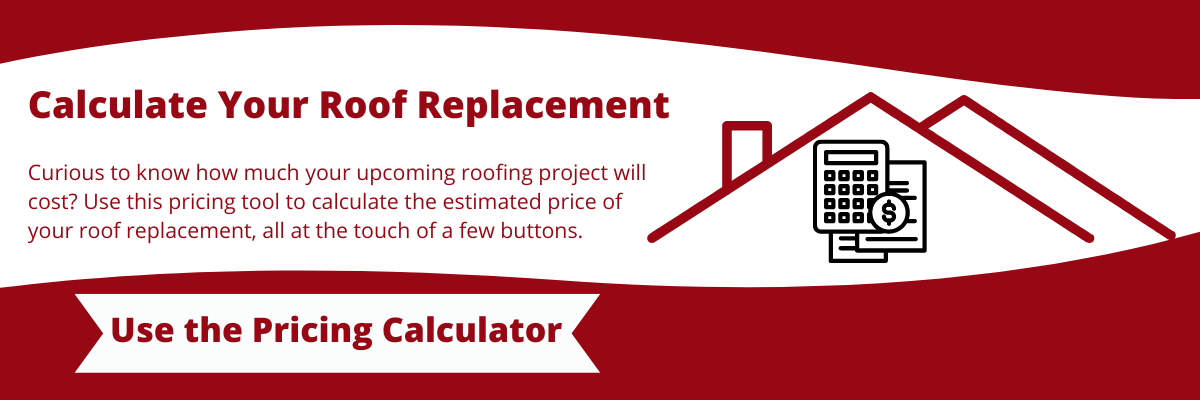Ultimate Guide to Calculating Your Roof Replacement Cost
January , 2025 | 13 min. read
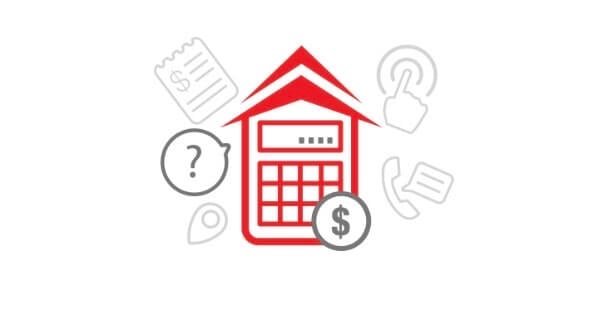
Is it getting close to the time to replace the roof on your home?
Or maybe you're wondering why roof replacement quotes vary so much.
Understanding how to calculate the cost of your roof can help you budget for the project. By doing so, it'll help you in making a well-informed decision.
But where do you even start?
Most of our clients came to us first asking for help calculating the cost of their roof for budgeting purposes. So we get it. With over 30 years of experience, our family at RoofCrafters knows that calculating the cost of a roof can be overwhelming for homeowners. That's why we've put together this guide to uncover the secrets behind roofing costs and how to budget smartly for your project.
In this article, you'll learn the three main factors that go into calculating the cost of a roof.
We promise by the end of this guide, you'll have a better understanding of how to calculate the cost of your roof. Hopefully, by the end, you'll be better equipped to create a realistic budget for your upcoming roof replacement.
Let’s get started!
Understanding the Key Factors That Affect the Cost of Your Roof Replacement
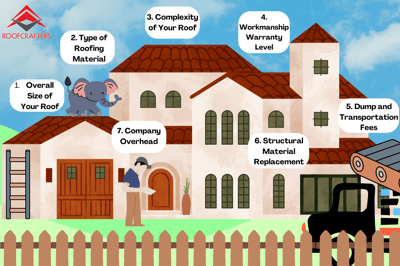
Many factors impact the cost of your roof replacement, such as the type of underlayment, the location of the job, and the time of year. However, in our 30 years of experience, we've found that there are three main factors needed to get an average cost for a roof replacement.
- The type of materials
- The square footage of the roof
- The slope of the roof
Let us review each of these 3 factors that'll impact the cost first. Then we'll cover how to put them all together.
Reflecting on Current Roofing Trends and Material Costs
The type of materials you choose for your roof replacement can have a significant impact on the cost of the project. Some materials are more expensive than others, but they may also offer greater durability or a longer lifespan.
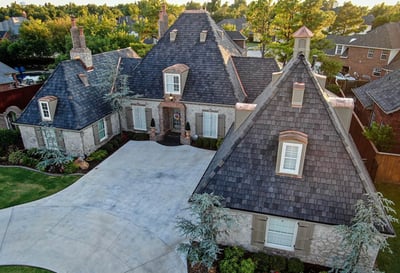
Additionally, some materials may need skilled installers or specialized equipment to install. This can also add to the cost of the project. Understanding the pros and cons of different roofing materials can help you choose the right one for your budget and needs.
3-Tab Shingles
Pros:
- Affordable and widely available
- Lightweight and easy to install
- Suitable for most climates
- Low maintenance
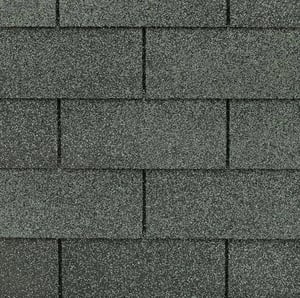
Cons:
- Shorter lifespan than other materials (15-17 years)
- Less durable than other materials
- Less visually appealing than other materials
- less protection and may blow off in high-wind areas
Architectural Shingles
Pros:
- Better durability than 3-tab shingles
- More visually appealing than 3-tab shingles
- Longer lifespan than 3-tab shingles (18-24 years)
- Suitable for most climates
- Easy to install
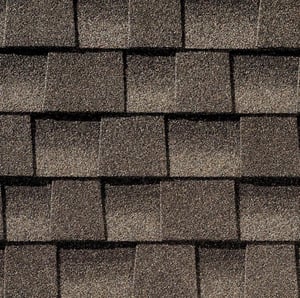
Cons:
- More expensive than 3-tab shingles
- Not as durable as a metal roof
- May not be suitable for extremely cold or hot climates
Upgraded Architectural Shingles
Pros:
- Longer lifespan than architectural shingles (25-30 years)
- Heavier and more durable and resistant to damage
- Thicker and more visually appealing than other shingle options
- Easy to install
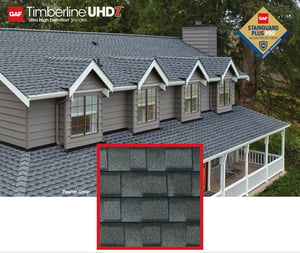
Cons:
- More expensive than other shingle options
- Not as durable as a metal roof
- May not be suitable for lower-slope roofs
Designer Shingles
Pros:
- One-of-a-kind and most visually appealing shingle option
- Longer lifespan than other shingle options (30-40 years)
- Heaviest and most durable and resistant to damage
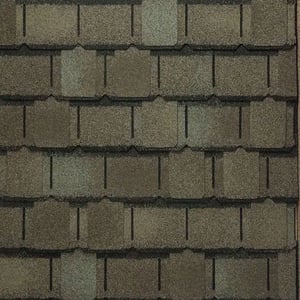
Cons:
- The most expensive shingle option
- Not as durable as a metal roof
- May not be suitable for lower-slope roofs
Screw-Down Metal Roof
Pros:
- Highly durable and resistant to damage
- Suitable for most climates
- Easy to install
- Energy-efficient

Cons:
- Not as visually appealing as other roofing materials
- Maintenance is needed at around the 5-8 year mark
- Can be noisy during heavy rain or hail
Standing Seam Metal Roof
Pros:
- Most durable and long-lasting roofing material (50+ years)
- Suitable for all climates
- Energy-efficient
- Low maintenance
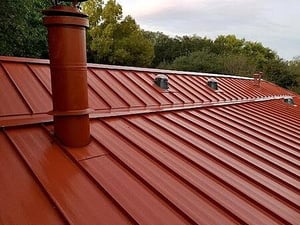
Cons:
- More expensive roofing material
- Requires skilled professional installation
- May not be suitable for some neighborhoods
These are some of the most popular material options. Now let's discuss how to measure your roof's square footage to get an accurate roofing materials cost comparison.
Accurate Measurement Techniques for Modern Roofs
Accurately measuring your roof's square footage is a critical part of calculating the cost of your roof replacement. Here's how to get an accurate measurement:
First, measure the length and width of each plane of the roof, including any dormers or other protrusions. Then, measure the length of each plane. Next, multiply the length by the width of each plane to get the square footage of each section of the roof.
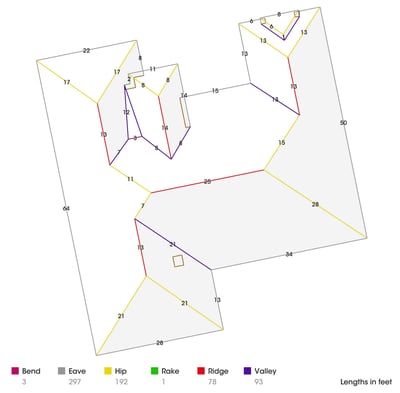
To calculate the total square footage of the roof, add up the square footage of each plane.
However, it's important to note that not all square footage measurements are created equal. A roof with more angles (hips & valleys) will have more cuts and thus use more waste.
The waste factor refers to the number of excess materials that will be needed due to the cuts and waste that occur during the installation process. This can vary depending on the complexity of the roof, such as its slope and the number of valleys, hips, and ridges. The more waste, the more materials are needed to complete the project. Which will result in a higher cost for the materials.
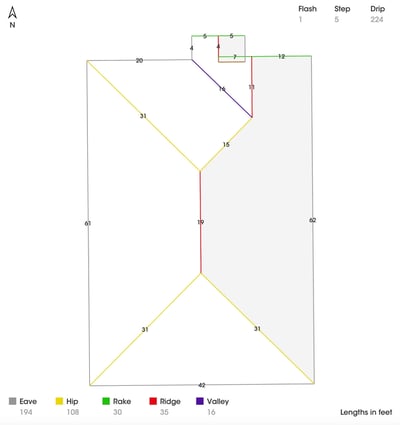
Roofing contractors typically estimate the cost of a roof replacement based on the square footage of the roof. But keep in mind they take into account additional factors needed for your roof replacement. Such as waste factor and extra labor cost for roofs with greater slopes which were going to be discussed in the next section.
Navigating Roof Slope and Complexity in Today’s Designs
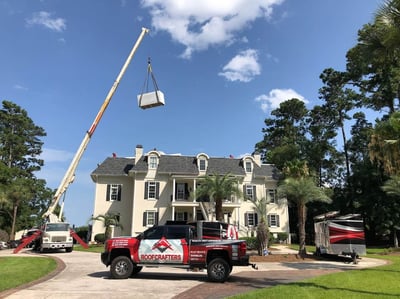
The slope or complexity of a roof can significantly impact the installation cost. A roof with a steeper pitch will take more labor. A complex roof design may also need additional installation steps, which can further increase the labor cost.
Besides the direct costs of materials and labor. There are more costs associated with complex steep-slope roofs. The new modern architectural designs of homes will affect the cost of a roof replacement.
Scaffolding and specialty equipment may be needed to ensure the safety of the workers. These extra costs are important to consider when calculating the total cost of the project.
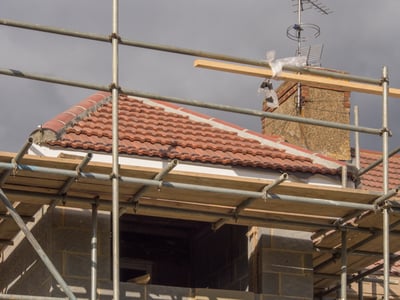
All these factors impact the cost of the project because they require more time, materials, and labor to complete. Roofing contractors must account for these extra costs when estimating the project's total cost. So, it's important to accurately measure the roof and factor in the complexity when creating your roof budget.
Putting It All Together: How to Calculate Your Roofing Cost
Calculating the cost of your new roof can seem like a daunting task, but it doesn't have to be. By understanding the three main factors - the type of materials, square footage, and slope - you can accurately estimate the cost of your project.
Here is a step-by-step guide to calculating the cost of your new roof:
- Determine the square footage of your roof by measuring the length and width of each section and then add them together.
- Determine the slope or complexity of your roof by visually inspecting it or consulting with a professional roofing contractor.
- Choose the type of materials you want for your new roof and estimate the cost per square foot based on your selection.
- Multiply the square footage by the cost per square foot of your selected material.
- Add any extra costs associated with the slope or complexity of your roof. Such as safety equipment, scaffolding, and extra labor.
To give you an idea of what to expect, let's take a look at two examples:
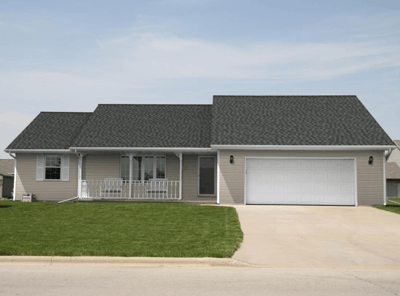 For a simple roof with asphalt shingles, the cost per square foot can range from $4 to $6 per square foot. With a square footage of 1,500, the total cost would be between $6,000 and $9,000.
For a simple roof with asphalt shingles, the cost per square foot can range from $4 to $6 per square foot. With a square footage of 1,500, the total cost would be between $6,000 and $9,000.
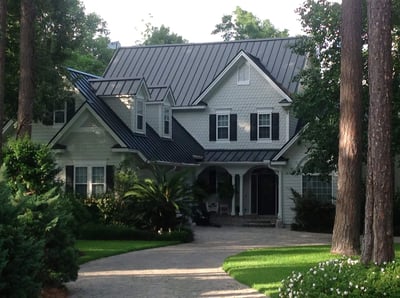 For a complex roof installing standing seam metal, the cost per square foot can range from $12 to $19. With a square footage of 2,500, the total cost would be between $30,000 and $47,500.
For a complex roof installing standing seam metal, the cost per square foot can range from $12 to $19. With a square footage of 2,500, the total cost would be between $30,000 and $47,500.
No Hassel Virtual Roof Estimates
For homeowners living in South Carolina, Georgia, or any of our Florida Markets, we now offer the most convenient way to get a roof estimate. This is a hassle-free solution that allows you to receive a detailed estimate without the need for an in-person meeting.
Our virtual roof estimates are designed to save you time and provide you with the information you need to make an informed decision from the comfort of your home.. Click "get My Virtual Estimate" to get started today!
Calculate the Cost of Your Roof Replacement
Calculating the cost of a new roof may seem like a daunting task. But by understanding the three main factors - materials, square footage, and slope - you can get a better idea of what to expect.
Follow the step-by-step guide outlined in this article. Use the example calculations provided. And you can more accurately estimate the cost of your new roof replacement and plan your budget. To make sure you get the best value, get quotes from 2-3 roofing contractors before making a final decision.
At RoofCrafters, we understand that a new roof is a significant investment for any homeowner. That's why we're committed to providing our clients with honest and transparent pricing. We've been providing quality workmanship and exceptional experiences for 3 decades. We're here to help.
We've also created a pricing calculator that is free to use. Keep in mind this is not an actual estimate. We created it to help you get a good idea of prices for budgeting purposes. And hopefully, it'll help you with your upcoming project.
At RoofCrafters, our mission is to provide job opportunities for others to thrive and grow while making a meaningful impact within our communities.





